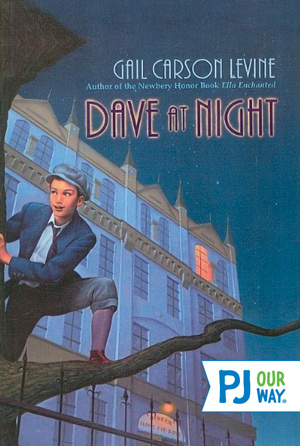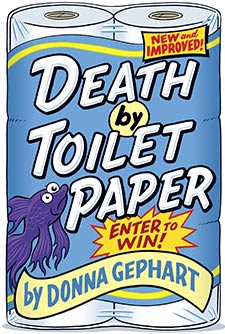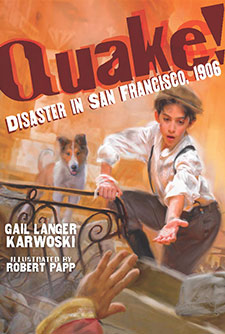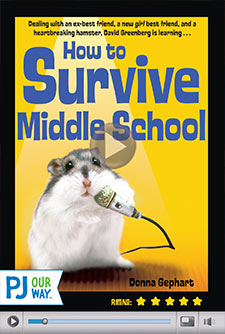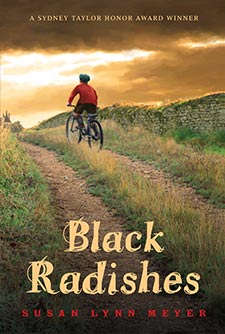Dave at Night
Dave used to be the big troublemaker of his family. Now he’s got no family, and he’s in BIG trouble. But one night he sneaks out of the orphanage into the big city, and everything changes…
Average Rating
( hint: Login to leave a review! )
130 Reviews
Leave Review
What the Book is About
Jewish Content & Values
Positive Role Models
Content Advisory
Talk it Over!
More for You
Inspired by her own father’s childhood experiences, Gail Carson Levine (author of Ella Enchanted) gets her young hero’s spunky voice exactly right. At the tender age of eleven, a tragic accident orphans Dave Caros, and he is sent by relatives to live at the HHB (Hebrew Home for Boys). Challenged by poor conditions, bullies, and a terrifying headmaster, Dave manages to foster friendships both inside and outside the orphanage walls. When Dave befriends an African-American girl and a colorful Yiddish-speaking con artist, he discovers that true family is not limited to actual relations. This fascinating and original story is set against the historical backdrop of the Harlem jazz age.
- Dave’s father is Sephardic, from Salonika, Greece. After his death, the family sits shiva for him and eats Sephardic eggs, which are hard boiled eggs that have been cooked for many hours in onion skins and coffee grounds.
- Yatom lo ta’hanoon (Exodus 22:20 -- do not cause suffering to an orphan.) Although Dave’s traumatic experiences at the Hebrew Home for Boys evidence poor application of this commandment, the actual orphanage that the story is based on was established by charitable donations to care for Jewish orphans in the community.
- Achdut (unity and solidarity): Although they often argue, the boys at the HHB demonstrate achdut by calling each other “buddies,” looking out for each other, and sharing their food after visiting days.
- Dave’s pluckiness, perseverance, and positive attitude in light of seemingly impossible circumstances is inspiring. Although he’s really sad about his father, angry at his brother, and furious at his relatives for deserting him, he develops perspective and learns to forgive.
- Solly is a complex character: at first glance he’s a shady operator who sells fake fortunes; however, despite his flexible relationship with the truth, his kindness and love for Dave make him a valuable ally and a steadfast friend.
Many sad events happen in this book: Dave’s father’s dies, he becomes an orphan, he is separated from his brother, and he is beaten at the hands of a villainous headmaster. Dave’s upbeat and innocent child’s voice make all of these events feel less disturbing and more palatable in the Dickensian style of orphanage stories set long ago. Some (adults) may be offended at the nod to Fagin in the portrayal of Solly, the old Jewish fortune teller who describes Irma Lee in Yiddish as a “shayna shvartze maidel,” a pretty black girl. One of the orphans describes the HHB as a “hell hole for brats.”
Solly calls his grown children “alrightniks,” and says that an alrightnik is someone who “forgets that he wasn’t born a doctor or a judge or a businessman. He forgets that a lot of people made it possible for him to get so high and mighty.” What do you think he means by this?
The HHB was based on a real Jewish orphanage in NYC called the Hebrew Orphans Association. Established in 1860, it was a reaction to the phenomenon of Jewish children being raised at non-Jewish orphanages with missionary goals. Mass Jewish immigration created social issues, and families who could not afford to feed their children chose to provide them with a future and vocation through the HOA. Unfortunately, childcare policy in those early years was not yet centered on the children, and many suffered under poor conditions, bullying, and corporal punishment. Conditions did improve over the years, and the 1920s saw a shift as the government began favoring the foster care system over orphanages. The HOA closed its doors in 1941.
What the Book is About
Inspired by her own father’s childhood experiences, Gail Carson Levine (author of Ella Enchanted) gets her young hero’s spunky voice exactly right. At the tender age of eleven, a tragic accident orphans Dave Caros, and he is sent by relatives to live at the HHB (Hebrew Home for Boys). Challenged by poor conditions, bullies, and a terrifying headmaster, Dave manages to foster friendships both inside and outside the orphanage walls. When Dave befriends an African-American girl and a colorful Yiddish-speaking con artist, he discovers that true family is not limited to actual relations. This fascinating and original story is set against the historical backdrop of the Harlem jazz age.
Jewish Content & Values
- Dave’s father is Sephardic, from Salonika, Greece. After his death, the family sits shiva for him and eats Sephardic eggs, which are hard boiled eggs that have been cooked for many hours in onion skins and coffee grounds.
- Yatom lo ta’hanoon (Exodus 22:20 -- do not cause suffering to an orphan.) Although Dave’s traumatic experiences at the Hebrew Home for Boys evidence poor application of this commandment, the actual orphanage that the story is based on was established by charitable donations to care for Jewish orphans in the community.
- Achdut (unity and solidarity): Although they often argue, the boys at the HHB demonstrate achdut by calling each other “buddies,” looking out for each other, and sharing their food after visiting days.
Positive Role Models
- Dave’s pluckiness, perseverance, and positive attitude in light of seemingly impossible circumstances is inspiring. Although he’s really sad about his father, angry at his brother, and furious at his relatives for deserting him, he develops perspective and learns to forgive.
- Solly is a complex character: at first glance he’s a shady operator who sells fake fortunes; however, despite his flexible relationship with the truth, his kindness and love for Dave make him a valuable ally and a steadfast friend.
Content Advisory
Many sad events happen in this book: Dave’s father’s dies, he becomes an orphan, he is separated from his brother, and he is beaten at the hands of a villainous headmaster. Dave’s upbeat and innocent child’s voice make all of these events feel less disturbing and more palatable in the Dickensian style of orphanage stories set long ago. Some (adults) may be offended at the nod to Fagin in the portrayal of Solly, the old Jewish fortune teller who describes Irma Lee in Yiddish as a “shayna shvartze maidel,” a pretty black girl. One of the orphans describes the HHB as a “hell hole for brats.”
Talk it Over!
Solly calls his grown children “alrightniks,” and says that an alrightnik is someone who “forgets that he wasn’t born a doctor or a judge or a businessman. He forgets that a lot of people made it possible for him to get so high and mighty.” What do you think he means by this?
More for You
The HHB was based on a real Jewish orphanage in NYC called the Hebrew Orphans Association. Established in 1860, it was a reaction to the phenomenon of Jewish children being raised at non-Jewish orphanages with missionary goals. Mass Jewish immigration created social issues, and families who could not afford to feed their children chose to provide them with a future and vocation through the HOA. Unfortunately, childcare policy in those early years was not yet centered on the children, and many suffered under poor conditions, bullying, and corporal punishment. Conditions did improve over the years, and the 1920s saw a shift as the government began favoring the foster care system over orphanages. The HOA closed its doors in 1941.

